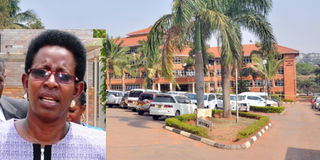Dr Atwine kicks up storm in Health ministry

On the spot. Ministry of Health head offices in Kampala. The ministry’s permanent secretary, Dr Diana Atwine (insert), is locked in a dog fight with members of staff and the Health Service Commission over filling of top jobs in the ministry. PHOTOS BY ERIC STEPHEN OTAGE/ RACHEL MABALA.
What you need to know:
Recruitment. The ministry’s permanent secretary has handpicked individuals she wants to occupy top positions of director and commissioner in the ministry.
Adogged fight over top jobs at the Ministry of Health has kicked up a storm, with the permanent secretary, Dr Diana Atwine, facing off with members of staff and the Health Service Commission.
Dr Atwine, who was previously President Museveni’s personal doctor and former director of State House’s Health Monitoring Unit, has handpicked individuals she wants to occupy top positions of director and commissioner in the ministry, something that the Health Service Commission and other actors say was done without following public service recruitment procedures.
A number of senior officials, sources say, have left the employment of the ministry in protest, and sought jobs outside the government setting, while others have chosen to lay back and watch the events unfold.
In some cases, experienced staff have requested for transfers to other government bodies. They accuse Dr Atwine of “importing her people” into the ministry without following the established processes and rules.
In one incident, a commissioner who had been posted at the ministry was granted a transfer request shortly after following a spat with Dr Atwine over her handling of the recruitment of staff. The said official, who was in charge of human resource, has since been moved to the Judiciary.
Dr Atwine denies the allegations.
The impasse
Dr Atwine has since appointed more than 10 personnel in the ministry to senior positions such as director and commissioner in acting capacity, despite opposition from both senior staff at the ministry and the Health Service Commission.
The commission is mandated to appoint, confirm, promote and review the terms and conditions of service, training and qualifications of health workers. It is also mandated to foster professional and work ethics, and exercise disciplinary control over health workers under its jurisdiction.
Senior officials at the ministry separately told Sunday Monitor that some of the staff handpicked by Dr Atwine lack the requisite academic qualifications and experience to run the offices they have been appointed to. We have learnt that some of the officials worked with the PS in different capacities during her tenure as the head of the State House Health Monitoring Unit.
“How do you get a person at the level of a medical officer to become a commissioner or assistant commissioner without going through the ranks?” one official wondered.
In a letter dated May 20, for instance, Dr Atwine wrote to the Health Service Commission forwarding names of 11 officials she wanted to be appointed to top positions.
“Any further delay to quickly fill these positions,” she wrote, “is likely to lead to failure of the Ministry of Health to achieve its national objectives and outcomes,” the letter reads, in part.
In the letter, she appeals to the commission to maintain some of the officers in acting capacity if they found their qualifications for the positions she had recommended them for wanting.
“In the event that the commission in its wisdom finds that some of the individuals do not fully meet the requirement, our request is that the officers be appointed in acting capacity,” the letter says.
Snubbed
The Health Service Commission, however, did not consider Dr Atwine’s proposal. We could not establish whether the commission responded to her letter, but 10 days later, on May 30, the commission placed an advert for the same jobs in the New Vision newspaper.
In her letter, also copied to the Minister of Health, Dr Jane Ruth Aceng, Dr Atwine had explained that the senior management of the ministry “undertook a rigorous talent search exercise, which resulted in the identification of suitable candidates to fill the vacant positions in the structure.”
The criteria used to select the 11 senior personnel, according to Dr Atwine, was attitude towards work and readiness to deliver under constrained resources, individual integrity and accountability, technical competence and teamwork.
“Secondly, the performance appraisal of these individuals has individually and collectively indicated that they are very resourceful to the sector. Appointing them substantively will go a long way to motivate them for the contribution to the health sector, which will enable the sector to deliver its mandate fully,” the letter adds.
The Health Service Commission, even with all this in view, proceeded with the recruitment process and selected candidates for the jobs, some of whom, sources say, have not yet been enabled to take the jobs they were chosen for.
Prof Pius Okong, who chairs the Health Service Commission, said he was busy in a meeting when we contacted him for a comment. He promised to speak to us later but did not respond to our follow-up phone calls and text messages by press time.
Dr Aceng, the minister of Health, said Dr Atwine, was working within her powers.
“The law allows the PS to make those appointments, but you ask her to explain. There is no issue there,” Dr Aceng said. Dr Atwine offered a lengthy response to the queries, which we run side-by-side with this story.
Officials in the ministry, who asked not to be named for fear of reprisal, told Sunday Monitor that the PS’s move would be justifiable if she had not handpicked the individuals in question without going through the proper appointment processes.
Dr Atwine’s take on some issues
When you came to the ministry, it had a new structure, which you rejected and the allegations are that you wanted another for selfish reasons. What happened?
We did not reject the structure, but instead realigned with the new priorities such as increasing staff of public health.
It was through a consultative process by all stakeholders. The issues of primary healthcare and disease prevention are priorities.
You are accused of bringing “your people” and giving them contracts.
There is no one I brought and fixed in the government structure. Those that are there went through the normal recruitment. The ones you are referring to could be those that are supported by [development] partners. This was necessary to get some staff to help me start reforms like accountability and other strategic areas. The interventions put in place have brought back partners’ trust, especially those who had stopped supporting the ministry.
If you want to know more, ask our partners, you will know the differences we have made.
What about the process of recruiting some of these people?
After our structure was approved, the Health Service Commission had to realign/validate the existing staff into the new structure. As an accounting officer charged with the human resource management, I was expected to recommend staff based on their performance. All the process was done well, except some I felt did not fit in the new positions. I requested Health Service Commission and they did exactly that after they assessed them. Therefore, the process was carried out as expected.
Granted, but the laws establish a process…
That it is right and everything went accordingly to the law. I made final submissions to the Health Service Commission and they validated them. The process is ongoing. Validation is different from recruitment of new staff. The Health Service Commission should take into consideration because I supervise and know capabilities of my staff. Recruitment of new staff is purely theirs.
Why are you withholding letters of some of the officials who passed through the process?
I asked the Health Service Commission to redesignate them based on the issues I highlighted. One had serious capacity issues. She would hardly attend to duties yet the department is so critical. I have asked the Health Service Commission to reassign her to a less-demanding department.
The second one has integrity issues and she is under investigations. I could not just sit and watch. I could not accept such an officer to be promoted.
The third one was working in a very small department and she was given a bigger one. She has capacity issues. She has not performed her duties well even in a small department. Government has lost millions of money due to her negligence.
As an accounting officer of the ministry, I reserve the right to guide on issues of performance of staff.
Do you suspect that the processes of the Health Service Commission were compromised?
I have no evidence to make allegations. They could be having challenges just like any other government agency.
Background
Restructuring: For about five years, the government undertook a public sector restructuring process. A new structure was developed for the ministry of Health in 2016. Officials at the Ministry told this newspaper that both Dr Aceng and Dr Atwine rejected the proposed structure and engaged a consultant called “Blessed” to develop a new structure.
“It (structure produced by Blessed) was taken to Public Service and was initially rejected, but they eventually succeeded,” an official said.
“They wanted to do away with the entire staff of the ministry and hire their own people, but the Health Service Commission rejected the idea. The commission said they would do a validation. Money was offered from IntraHealth, a Usaid project but the Health Service Commission rejected and proceeded to do a validation. They tried to influence the validation,” the official claimed.
Prior to getting the new structure, the top ministry honchos had handpicked four commissioners, including the commissioner for Ambulance, commissioner for Quality Assurance and one for Clinical Services. Against Public Service recruitment rules, sources in the ministry say one person was shortlisted for each of the available positions and were subsequently appointed.
“The problem with their structure is that it is top-heavy with four directors, 19 commissioners, 44 assistant commissioners and so many principals, senior medical officers, among others. The old structure had two directors, five commissioners and about five or six assistant commissioners,” a source said.
Even the structure they challenged had slightly increased the number of directors and commissioners, but it was not as top-heavy as the new one, sources say.



